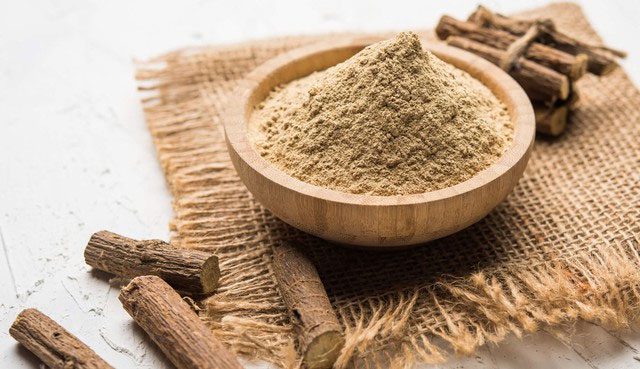This is a medicinal herb in Traditional Chinese Medicine used to treat various ailments. Modern science has proven its anti-cancer properties.
That herb is licorice. Licorice has a naturally sweet flavor and offers numerous health benefits. Some studies indicate that licorice may even prevent cancer and remarkably slow its progression.
Health Benefits of Licorice According to Scientific Research
1. Alleviates Digestive Issues
According to a study published in the Textbook of Natural Medicine, licorice can help reduce digestive problems such as heartburn and gastric ulcers.
2. Manages Menopausal Symptoms
A study published in The Author Manuscript suggests that licorice may act like estrogen in the body and can be used as a natural method to manage menopausal symptoms.
3. Reduces Cough and Sore Throat Symptoms

Licorice helps treat various respiratory diseases. (Photo: Internet).
Licorice has been shown to reduce cough, sore throat, and symptoms associated with infections from various respiratory viruses.
Licorice contains significant levels of glycyrrhizin, the active compound responsible for its distinctive sweetness. Several in vitro studies indicate that this compound can combat the SARS-CoV-2 virus.
Animal studies also show that glycyrrhizin may help alleviate asthma symptoms. However, human studies are limited, and more research is needed to evaluate these benefits.
4. Controls Bone Loss
Bone loss, also known as osteoporosis, is a condition where bones gradually lose strength and become fragile, making them prone to fractures even with minor impact. This occurs when the rate of bone breakdown exceeds the rate of new bone formation, leading to reduced bone density and structural integrity.
According to animal studies, glycyrrhizin may help manage bone loss and age-related tissue degeneration in older adults. This is due to glycyrrhizin’s anti-inflammatory properties, which reduce bone breakdown and enhance compounds that protect bones.
5. Supports Adrenal Function
The adrenal glands regulate cortisol— the stress hormone— in the body. Licorice has the ability to inhibit cortisol, potentially supporting adrenal function.
6. Cancer Prevention

Licorice has cancer-preventive properties. (Photo: Internet).
According to information from Healthline, licorice contains many plant compounds with antioxidant and anti-inflammatory effects. Extracts from licorice roots have been shown to combat several types of cancer, including skin, breast, colorectal, and prostate cancers.
Additionally, licorice root extracts may help treat inflammation and oral ulcers— side effects of chemotherapy and radiation therapy in cancer patients.
Precautions When Using Licorice
According to Associate Professor Dr. Nguyen Thi Bay, Ho Chi Minh City University of Medicine and Pharmacy – Campus 3, licorice is frequently used in Traditional Chinese Medicine prescriptions. This is because it harmonizes the effects of other herbs and helps deliver them to target tissues, enhancing their interactions.
In Traditional Chinese Medicine, licorice has a sweet taste, is neutral in nature, non-toxic, and is known to strengthen the spleen, boost energy, detoxify, warm the center, enhance essence, moisturize the lungs, relieve pain, promote digestion, and clear heat.
Dr. Bay notes that the primary components found in licorice are steroid saponins and flavonoids. With these components, some effects that licorice may provide include:
- The steroid saponins in licorice have effects similar to the “miraculous drug” cortisol in Western medicine.
- Licorice has anti-inflammatory effects, effectively reduces cough and pain.
- Licorice has detoxifying properties.
- It alleviates smooth muscle spasms in the digestive tract and treats gastric ulcers, heartburn, abdominal pain, etc.
- Some studies also suggest that licorice may be effective in treating Addison’s disease (adrenal insufficiency).
However, according to Dr. Bay, when using licorice, individuals should be cautious about the following:
- While licorice may be safe in most cases, consuming it daily for several weeks or longer can lead to serious side effects such as high blood pressure, low potassium levels, weakness, paralysis, and occasionally brain damage in healthy individuals. Therefore, people should not use licorice regularly.
- Pregnant women should not consume licorice or use licorice root as a supplement.
- Individuals with kidney inflammation exhibiting symptoms like swollen eyelids, decreased urination, or those with liver inflammation or cirrhosis showing signs of edema should avoid licorice.
- People with high blood pressure or unstable blood pressure should also refrain from using licorice.
- Those with chronic constipation due to excessive heat in the colon, especially individuals who are weak or elderly, may increase the risk of constipation if they use licorice.
Dr. Bay further emphasizes that while licorice has many benefits, caution is essential when using this herb. Ideally, if you wish to use licorice for medicinal purposes, consult a healthcare professional to create a suitable and safe herbal formula.


















































